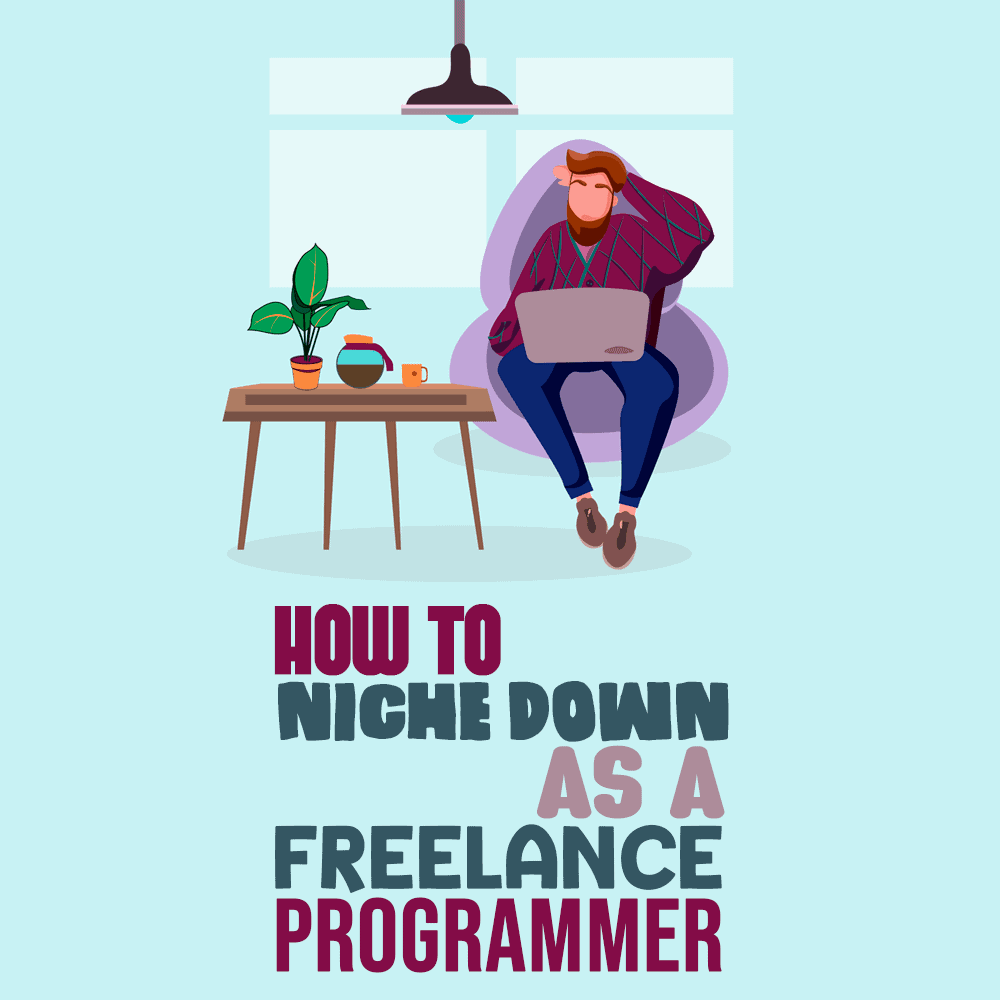
Who is a specialist, anyway? Let me use doctors to illustrate the difference between specialists and generalists. Anyone who has a medical degree can be called a doctor, but not everyone is a brain surgeon, for example.
A specialist is someone who is an expert in a very narrow domain, while a generalist is a person that typically knows many things about different domains but doesn’t have deep knowledge and much experience in any one of them.
How do you become a specialist as a programmer?
The answer is simple: You pick one area that you want to be good at and you start working on projects only in that area to get as much experience as you can.
In the freelancer’s world, this is called “niching down.” In this article, I would like to introduce you to the concept of a niche and why niching down may be one of the best decisions that you can make for your freelancing business.
What Is a Niche?
A niche (or a niche market) is essentially a subset of the general market that is defined by its own set of characteristics. It may sound a bit too abstract, so let me explain.
Software development for accounting firms with over 1,000 clients would be an example of a niche. It’s a subset of the bigger software development market. This niche has a clearly defined client persona—an accounting firm that has more than 1,000 clients.
Another example of a niche would be React.js development services, which is a much narrower subset of a broader specialty, JavaScript development services.
Let me explain the differences between different types of niches.
A Horizontal Niche
Imagine a web developer who only specializes in building backend applications using Node.js, and he does that for companies from all kinds of industries. He doesn’t limit himself to working with a specific industry or a specific type of company, but instead he only provides one type of service. That is a good example of a horizontal niche.
This approach has an advantage: You have a very big pool of potential customers if you pick a technology that is reasonably popular.
The downside to this approach is that if the technology dies in a few years, you will lose your clients and will probably need to learn a new one. That’s what happens a lot in the programming world, doesn’t it?
A Vertical Niche
A vertical niche instead focuses on defining your customer profile rather than focusing on a specific technology. For example, a programmer who builds websites for nonprofits is a good example of a person who has picked a vertical niche.
In this case, you don’t focus on the technology as much as the deliverables. One year you may be building a website using PHP and WordPress, and in the next year you may use the ASP.Net MVC framework or a headless JavaScript CMS like Keystone.js.
One major advantage of this approach is that you won’t need to change many things in your marketing approach if a particular technology becomes obsolete.
If you are already well known for building great websites for nonprofits, then you will keep attracting those types of clients.
The truth is that most clients don’t care about the technology that you use. They care about the price and the results that you’re going to bring them.
The downside of this approach is that you will need to adapt to the technology market changes. Frameworks and programming languages evolve and change constantly. A good example is jQuery, a JavaScript framework that used to be implemented on almost every website is now being forced out by a PWA approach and new frameworks like React.js, Angular, and Vue.js.
Why You Should Consider Niching Down

Let me give you some reasons why you should consider niching down as a freelance programmer:
- You will gain experience faster regardless of whether you pick a vertical or a horizontal niche. If you decide to specialize in a particular technology and only work on projects that use it, you will come across all different types of scenarios and problems much more often. And once you learn how to overcome or prevent them, it will be easier for businesses to hire you because it’s less risky.
- Your efficiency levels will grow. If you utilize a particular technology all the time, you will learn its strengths and weaknesses. Not only that, but you will also naturally become more efficient as a programmer since you will be repeating certain procedures every time. The more efficient you become, the faster you can finish the project and the higher rates you will be able to command.
- Marketing will be easier for you. As a freelance programmer, you probably know that marketing is important in building a brand, developing trust, and attracting better clients. When you decide to specialize, your message to the world will be clearer and more consistent. It will be much easier for you to create content because you will know exactly the central theme of your marketing message.
- You will become more referable. Imagine that you have two friends who are developers: one is a regular front-end developer and another is a React Native developer who specializes in building lighting-fast mobile apps. If a CEO of a company was looking to build a mobile app using React Native and asked you to recommend someone, which one of your friends would you refer?
Once you have become convinced that niching down is something worth considering, the next thing to do would be to decide what niche would suit you the best.
How To Decide What Niche Is the Best for You?
This is often the toughest choice that freelancers face. They are scared that once they niche down they will lose all the work and their clients.
We tend to think that the less that we offer, the fewer leads we will have and therefore less business and work. While that can be true in new markets, it’s not true in very saturated markets where most of your competitors offer the exact same list of services as you do.
If you currently offer multiple different services and find it hard to get new leads, then what harm will it do if you niche down and try it out for six months, for example?
On the contrary, it can be easy to niche down for some freelance developers. They can just take a look at their client base and see what category the majority of them belong to and then decide to only work with that category of clients.
For others, it can be a more difficult choice. Here are some of the criteria that you can use to pick the right niche for you:
- What are you good at? Audit your skills and the technologies or frameworks that you have used in the past and see which ones are you good at. If you’re good at one framework like React.js, for example, pick it.
- What types of projects would you like to work on? Do you prefer short projects or long ones? Do you like working with startups or corporations? Is there a particular industry that you’re passionate about and that you’d like to work with? Think about it thoroughly and write down what types of clients and projects you’d like to work with.
- Is there a demand in the marketplace? The next step is to examine the marketplace to see if your niche is good enough. Take a look at the job portals, talk to other freelancers and specialists in your niche. If you do that, you should have a good sense of whether or not there is a demand.
Ideally, all three of the criteria above should match well. For example, there is no point in specializing in building mobile apps using React Native for roofing companies, if they don’t need them. So keep examining and researching until you find a good overlap between these three criteria.
How I Was Able to Benefit From Niching Down
I’ve been freelancing as a WordPress developer since July 2017. If you’ve ever been a freelancer, you know that it’s hard to get good quality and high-paying clients in the beginning. It takes a lot of time to build your portfolio and credibility.
Until December 2019, I was just like that. I’d joined Codeable, a freelance platform, and I was making enough for a living. However, I wanted to progress, get better clients, and be able to compete for some of the higher-paying projects.
So, in the middle of December 2019, I decided to narrow down my specialty and start focusing on building WordPress membership and e-learning websites. I didn’t try to specialize in certain types of projects, so you may say that it is an example of a horizontal niche.
When I started, I didn’t have any membership websites in my portfolio, but I saw that these types of projects were reasonably popular on Codeable, and there was not much competition.
I thought that if I started looking for these projects, eventually I would build a good portfolio that would help me win even more and bigger projects over time. I didn’t do any special training, except for reading the documentation and watching some random tutorials online.

That was when I made my decision. Looking back, I can say that it has been the best decision in my freelance career.
In less than seven months, I was able to make twice as much as I made in the entire 2019, by creating a website and writing copy tailored to people looking for a membership site developer. It has become a great conversion tool since I am able to differentiate myself from everyone else.
Competing for projects has become a lot easier and I am able to come up with estimates for the projects much faster, since I better know the technologies that will be used.
Start Niching Down Today
I hope that you see the benefits of picking a niche and becoming a specialist in it if you are a freelance programmer. It’s probably one of the best things that you can do for your freelance career if you’re serious about becoming an in-demand expert.
It will help you get more quality projects, find better clients, and make more money. Not only that, but you will also be able to decide which projects you want to take on once you have enough leads coming in.
I would highly encourage you to at least consider niching down and trying it out for six months or so. And once it starts working, your only regret will be that you didn’t do it earlier.
